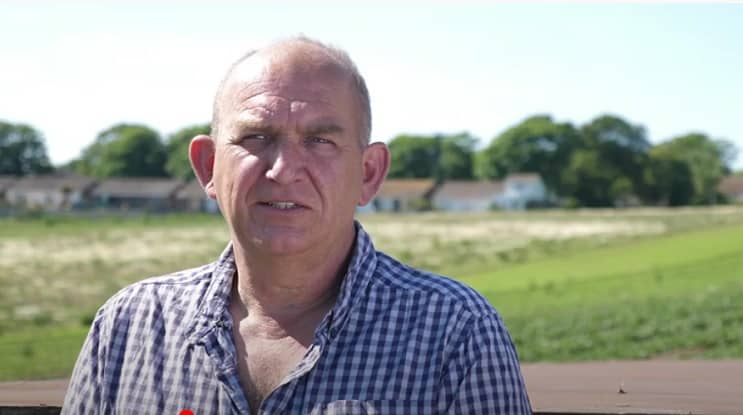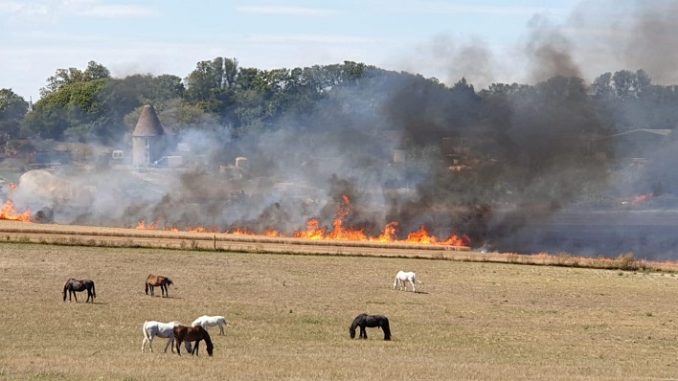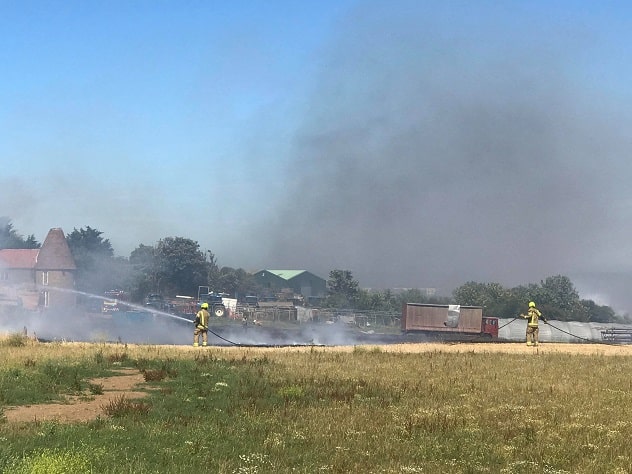
A farmer who saw his livelihood destroyed by a grass fire, said he feared the devastating blaze could have costs lives and is now appealing to the public to be responsible when outdoors.
Five fire engines and two multi-terrain vehicles were sent to Geoffrey Philpott’s farm in Broadstairs, where a blaze was rapidly spreading to 14 hectares of land – including crops and a field full of horses.
Now, Geoffrey has thrown his support behind Kent Fire and Rescue Service’s (KFRS) campaign to reduce the number of accidental grass fires, which aims to educate the public about what they can do to help and stay safe.
He said: “It was just devastating. You spend 10 months growing a crop, you’ve nurtured it, cared for it and it’s just about to harvest, and then it’s all just wiped out in no time at all. You’re left with nothing.
“The fire spread rapidly and destroyed a fence to a field where at least 40 horses were at the time. Suddenly, you’ve got a lot of animals scared because of the heat and the flames, so they had to be quickly moved.
“A fire takes no prisoners, it just destroys everything in its path. There were people’s lives at risk.”
In 2020, crews responded to 617 accidental grass fires – an increase of almost 200 incidents when compared to 2019.
The incident at Geoffrey’s farm happened in August last year, with hot temperatures and strong winds making the conditions even more treacherous.
Most grass fires happen between May and September, when grassland can get very dry, and 2020 was no exception with 83% of all grass fires that year happening in the summer months.
As well as using hose reel jets, firefighters used off-road fogging units and beaters to extinguish the flames. They also worked with the farm workers to create a fire break around the fields to stop the fire from spreading – but the damage to Geoffrey’s livelihood was sadly irreversible.

He added: “The crops were destroyed, so obviously there’s a monetary value in that but in situations like this, you have to take stock, and think thank goodness no-one was hurt.
“Grass fires have a devastating knock-on effect. Not only do you lose your crop but it puts people’s jobs at risk, due to the potential amount of damage, or you might lose supply contracts for other businesses that you’ve been growing a specialist crop for. It’s not just a field that’s burnt to the ground.”

KFRS Station Manager, Shaun Humphries, was officer-in-charge at the incident and although the exact cause remains unknown, he is stressing the importance of taking extra care when enjoying the outdoors this summer.
He said: “Grass fires have a devastating impact, not just on livelihoods but wildlife, property, and lives can even be put at risk. A majority of these types of fires are preventable however, and we can all play a part in making sure they don’t happen in the first place.
“Enjoy the outdoors, but please be responsible and think about the consequences of your actions – lighting a bonfire or barbecue too close to greenery, or throwing a hot cigarette onto the ground, are common causes of grass fires we attend. So, please think before you act, and protect yourself and everyone else, by following our simple safety tips.”
- When lighting a bonfire, keep it to a manageable size, make sure it’s well clear of greenery and property, and always supervise it while it’s burning. Also, avoid having a bonfire in windy weather.
- Dispose of smoking materials responsibly, making sure they’re fully stubbed out and cooled before being put in a bin – consider using a portable ashtray when on the go.
- Place disposable barbecues on a sturdy, non-flammable surface when cooking, away from greenery and property, and only place in a bin once cold.
For Geoffrey, his land continues to recover from the fire and thankfully, he and his team have been able to continue growing crops and vegetables.

